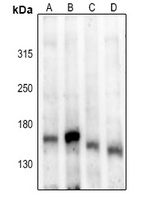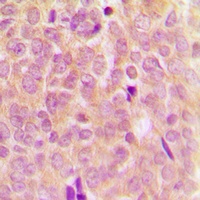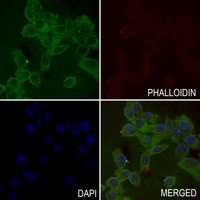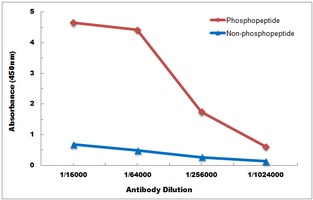You have no items in your shopping cart.
ASK-1 (phospho-S83) antibody
Catalog Number: orb344610
| Catalog Number | orb344610 |
|---|---|
| Category | Antibodies |
| Description | ASK-1 (phospho-S83) antibody |
| Species/Host | Rabbit |
| Clonality | Polyclonal |
| Tested applications | ELISA, WB |
| Reactivity | Human |
| Isotype | IgG |
| Immunogen | This purified antibody was prepared from rabbit serum after repeated immunizations with a KLH conjugated peptide corresponding to an internal region near amino acids 75-100 of human ASK-1 protein. |
| Concentration | 1.0 mg/mL |
| Dilution range | ELISA: 1:5,000 - 1:10,000, WB: 1:1,000 |
| Form/Appearance | Liquid (sterile filtered) |
| Purity | This product is an IgG fraction antibody purified from antiserum by a multi-step process which includes delipidation, salt fractionation and ion exchange chromatography followed by extensive dialysis against the buffer stated above. Assay by immunoelectrophoresis resulted in a single precipitin arc against anti-Rabbit Serum. No reaction was observed with ASK-1 from mouse sources. Reactivity with the kinase from other sources has not been determined. |
| Conjugation | Unconjugated |
| UniProt ID | Q99683 |
| NCBI | NP_005914.1 |
| Storage | Store vial at -20° C prior to opening. Aliquot contents and freeze at -20° C or below for extended storage. Avoid cycles of freezing and thawing. Centrifuge product if not completely clear after standing at room temperature. This product is stable for several weeks at 4° C as an undiluted liquid. Dilute only prior to immediate use. |
| Buffer/Preservatives | 0.01% (w/v) Sodium Azide |
| Alternative names | rabbit anti-ASK1 pS83 Antibody, Apoptosis signal r Read more... |
| Note | For research use only |
| Application notes | This phospho specific polyclonal antibody reacts human pS83 ASK1 and shows minimal reactivity by western blot, ELISA and competitive ELISA with non-phosphorylated ASK1. Although not tested, this antibody is likely functional in RIA, immunohistochemistry and immunoprecipitation. For immunoblotting a 1:1,000 dilution is recommended. A 155 kDa band corresponding to human ASK-1 is detected. Whole cell lysates from SW1353 can be used as a positive control. For ELISA a 1:5,000 to 1:10,000 dilution is recommended. Researchers should determine optimal titers for other applications. |
| Expiration Date | 12 months from date of receipt. |
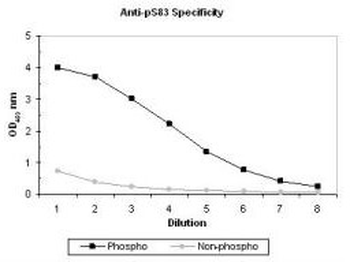
ELISA results of purified polyclonal anti-pS83 ASK-1 antibody tested against BSA conjugates of non-phospho and phospho forms of immunizing peptide. Each well was coated with 0.1 mg of conjugate. The starting dilution of antibody was 1:1000 and each point on the X-axis represents a 2-fold dilution. HRP conjugated Gt-a-Rabbit IgG H&L and TMB substrate were used for detection.
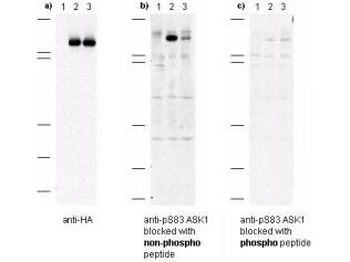
Western blot of anti-pS83 ASK1 antibodies shows specificity for phosphorylated human ASK1. Anti-pS83 (aa 76-87) antibody was tested by western blot against Cos-7 cell lysates after transient transfection with 1) vector only, 2) recombinant HA-ASK1, and 3) recombinant human HA-ASK1 where S83 was substituted with an alanine residue. Cells were lysed 24 h post-transfection in 200 µL of 1x SDS-sample buffer, heated at 96°C for 5', and vortexed for 30 sec. Samples (10 µL each) were separated on a 12% SDS-PAGE gel and transferred to PVDF (Millipore) followed by blocking for 45' using TTBS supplemented with 5% non-fat dry milk. All incubations were performed at room temperature. In panel a) all samples were incubated with anti-HA antibody. This blot demonstrates both recombinant transfections express rASK1. In panel b) all samples were incubated with anti-pS83 ASK1. Lane 2 shows strong specific staining of ASK1. Lane 3, where S83 was replaced with alanine, shows greatly diminished staining. In panel c) all samples were incubated with anti-pS83 ASK1 antibody as before except the antibody was pre-incubated with phospho peptide prior to membrane incubation. No staining is observed after phospho peptide blocking occurs.
ASK1 (Phospho-S83) antibody [orb315596]
IF, IH, WB
Human, Mouse, Rat
Rabbit
Polyclonal
Unconjugated
200 μl, 100 μl, 30 μlMAP3K5 (Phospho-S83) antibody [orb570730]
ELISA, IHC, WB
Human
Rabbit
Polyclonal
Unconjugated
50 μg, 100 μgASK-1 non (phospho-S83) specific peptide [orb343858]
Unconjugated
Greater than 95% specific peptide
Human
50 μg
Filter by Rating
- 5 stars
- 4 stars
- 3 stars
- 2 stars
- 1 stars


